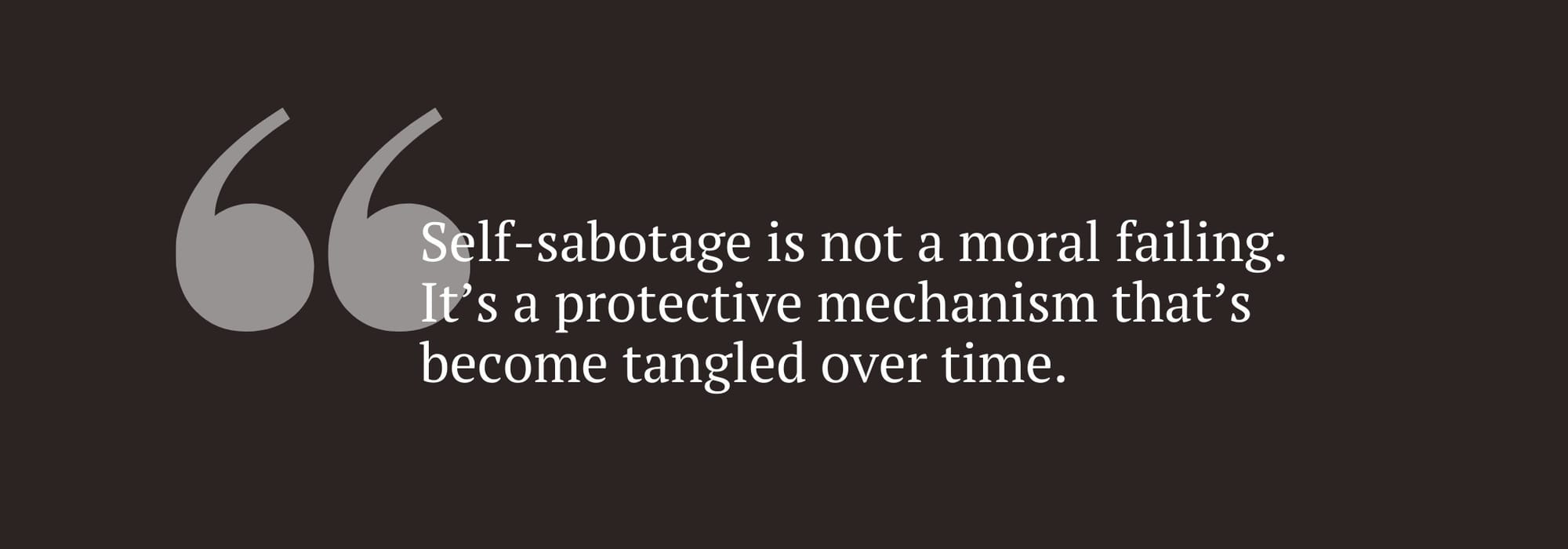Putting self-sabotage under the spotlight to learn how we can flip the script
Self-sabotage can sneak into almost any area of life. It could be procrastination, like missing deadlines and convincing yourself you’ll start tomorrow. It can show up as perfectionism, where you’re endlessly tweaking a project so it’s never quite ready. Or, it can take the form of avoidance, such as leaving a relationship before it’s had a chance to grow. Whichever way it appears, it often leaves people asking: “Why do I always do this to myself?”
In therapy, I help clients understand self-sabotage not as a personal flaw, but as part of a wider pattern of thinking and behaving. It’s rarely about laziness, weakness, or lack of willpower. More often, it comes from behaviours that made perfect sense when we were growing up – strategies that helped us stay safe, be accepted, and get our needs met. I often say to clients that we carry psychological software from childhood, and sometimes it just needs an update.
From a transactional analysis (TA) perspective, self-sabotage can often be traced to what’s called a ‘life script’. This is an unconscious blueprint for living, which we shape ourselves in early childhood based on messages from our family and society, telling us how to survive and belong. These scripts are made up of deeply embedded beliefs, decisions, and rules that once served us, but may now actually keep us stuck.
For instance, if you often heard “Don’t get too big for your boots,” or your family criticise someone for standing out, your script might say: “It’s safer not to shine.” As an adult, you might truly want to succeed, yet find yourself missing deadlines, pulling back from opportunities, or doubting your own abilities. It’s not because you lack ambition, it’s because your inner script is steering you toward the familiar safety of staying small.

One client I worked with dreamed of starting her own business. Each time she got close, she found reasons to delay, such as telling herself she wasn’t ready, or that she needed to do more research. When we explored her history, we found that ambition in her family was met with criticism and mockery. Her life script had taught her that aiming high meant risking love and acceptance.
From this perspective, self-sabotage isn’t a failure, it’s a loyal but outdated strategy. By recognising the old story, you can begin to choose a new one. This time, you get to write it as an adult, with more resources, options, and autonomy than you had as a child. You might have learned to hold back to avoid criticism, to keep the peace, or meet someone else’s expectations. But those once-helpful strategies can quietly become the barriers to your personal growth.
Self-sabotage can also be understood through the lens of nervous system regulation. When a situation triggers anxiety, be that fear of failure, conflict, closeness, or even fear of success, the body can react as if it’s under threat. The nervous system can slip into fight, flight, or freeze mode leading to procrastination, perfectionism, or checking out completely. In the short-term, these states can soothe discomfort, but, over time, they create a cycle where avoiding stress keeps us from achieving our goals or having the life we want. Noticing what’s happening in the body, and trying to regulate with some grounding exercises, will help to break this cycle.
The most important thing to remember is that self-sabotage is not a moral failing. It’s a protective mechanism that’s become tangled over time. Or a bodily response intended to keep us safe. When we approach this very human phenomenon with curiosity and kindness, rather than shame and self-criticism, we can begin to understand its purpose.
Through therapy, reflection, and self-awareness, it is possible to rewrite your life story, reconnect with your authentic self, and integrate the parts of you that have been, until now, in conflict. That’s when self-sabotage stops being the enemy, and becomes a path to awareness, choice, and change.
Start noticing
Catch yourself in the act of self-sabotage. Instead of beating yourself up, ask: ‘What’s this behaviour trying to protect me from?’
Discover your rules
Write down the phrases and rules you learned growing up. Are they still true for you, or are they someone else’s voice? Do these rules lead to tripping yourself up in adult life?
Let conflicting parts speak
If one part of you wants change and another resists, give each part a voice. You might be surprised by what each voice has to say.
Seek a safe relationship for exploration
Working with a counsellor offers a non-judgemental space to explore your patterns, challenge your script, and experiment with new ways of being.


Comments